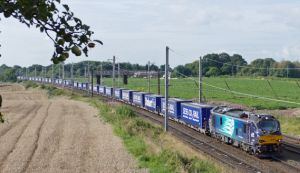Archives
Feature, Freight News, Rail
Longer trains take the strain
[ December 18, 2020 // Chris ]Trains of up to half a mile long have helped deliver more critical goods such as food and medicines during the Covid pandemic in moving critical goods, says national rail infrastructure operator, Network Rail.
Since the start of 2020, Network Rail and rail freight operators have collaborated to allow freight trains to move more goods each time they run, and with reduced demand for passenger travel, trains have been rescheduled to make better use of network capacity, it says.
Several trains have been temporarily lengthened to 775m long, allowing 12-14 more containers to be carried each time. This includes trains between Southampton and Leeds, Manchester and Birmingham, and between Daventry and Grangemouth.
Steel trains between Scunthorpe and Teesport have been lengthened allowing up to 1000 tonnes more to be moved on each train.
A daily service from Mossend to Daventry is temporarily benefiting from a one-hour reduction in journey time and a more long term solution would release 10 twin platform intermodal wagons through improved asset utilisation.
NR adds that there is a growing body of evidence of the benefits of more efficient freight schedules on air quality emissions. Recent analysis shows that trains which are frequently looped off main lines to allow passenger trains to pass, emit 14-20% more NOx and particulates than non-stop freight services.
Managing director of Direct Rail Services, Chris Connelly, said: “Throughout this challenging year, rail freight has proved that it is absolutely essential in keeping our supermarkets and shops stocked. Our Mossend to Daventry trains utilise the state-of-the-art Class 88 locomotive to carry the equivalent of 38 lorry loads of vital goods the 310-mile distance with zero exhaust emissions, making it the greenest way to transport goods by far. The new timetabling allows these services to run the same route more quickly, with less time spent waiting in sidings.”

Tags: Network Rail; Direct Rail Services












